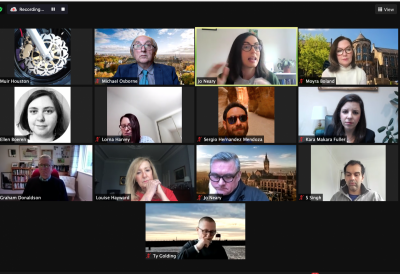Dr Muir Houston, Deputy Director of CR&DALL opened the webinar and provided an overview of logistics for the 80+ delegates and panellists. Professor Michael Osborne, Director of Research in the School of Education, began formal proceedings.
Professor Osborne explained that Collaborative Schooling for Change was the second of five major themes around which research within the School of Education is built. Central to that work is a belief that tackling educational inequity is one of the most significant challenges of our time and one that has been accentuated in recent times by the COVID-19 pandemic. He argued that such grand challenges are best addressed by researchers working across disciplines and in partnership with policy-makers and practitioners to develop new theoretical insights and practical approaches that level the playing field so that all children can achieve their full potential irrespective of their background. This would be illustrated by all of the research presented today.
Network for Social and Educational Equity
 Professor Chris Chapman and his team, across a range of projects, have focused on the interplay between educational and public service research, policy and practice, specifically in relation to the improvement of educational outcomes in disadvantaged settings. In this webinar, Chris with Dr Jo Neary specifically gave an overview of the work of the Network for Social and Educational Equity (NSEE) in supporting collaboration within and between schools, and across local authorities in order to tackle educational inequities. Reflecting on the evolution of NSEE, from the establishment of the School Improvement Partnership Programme in 2013 and extending to the West Regional Improvement Collaborative in 2018, Chris and Jo highlighted the impact and geographic spread of the approach in supporting schools, and the integral role that Collaborative Action Research (CAR) plays in supporting sustainable evidence-based school improvement.
Professor Chris Chapman and his team, across a range of projects, have focused on the interplay between educational and public service research, policy and practice, specifically in relation to the improvement of educational outcomes in disadvantaged settings. In this webinar, Chris with Dr Jo Neary specifically gave an overview of the work of the Network for Social and Educational Equity (NSEE) in supporting collaboration within and between schools, and across local authorities in order to tackle educational inequities. Reflecting on the evolution of NSEE, from the establishment of the School Improvement Partnership Programme in 2013 and extending to the West Regional Improvement Collaborative in 2018, Chris and Jo highlighted the impact and geographic spread of the approach in supporting schools, and the integral role that Collaborative Action Research (CAR) plays in supporting sustainable evidence-based school improvement.
CAMAU
Professor Louise Hayward and Dr Kara Makara-Fuller presented research that has been funded by the Welsh Government, CAMAU, which has been concerned with Progression and Assessment in the Curriculum for Wales. This research emanates from theProfessor Louise Hayward and Dr Kara Makara-Fuller presented research that has been funded by the Welsh Government, CAMAU, which has been concerned with Progression and Assessment in the Curriculum for Wales. This research emanates from the University of Glasgow Educational Assessment Network (UGEAN), which seeks to transform assessment to promote justice for every learner. UGEAN in turn is a member of the International Educational Assessment Network (IEAN), a network of researchers, policymakers, and practitioners from twelve nations/states who collaborate to shape assessment futures. The presentation focused on work in one of the IEAN nations, Wales, currently undergoing major educational reform. The CAMAU project, a collaboration between the University of Glasgow, the University of Wales Trinity Saint David, and the Welsh Government, has been designed to work with the Welsh education system to co-construct a new, progressive assessment system. CAMAU collaborated closely with teachers, researchers, and policymakers in Wales to identify how progression might best be discerned across the curriculum. In phase one, CAMAU built and used an evidence base on progression in learning: from practice, exploring teachers’ and learners’ understandings of progression; from research and policy on progression; and from other countries internationally. To promote the effective use of evidence, the project created Decision Trees as an innovative approach to evidence-informed decision making. Finally, the project team sought to learn from the success of the first phase of the CAMAU project. Using surveys and interviews with policymakers and practitioners, the team identified key factors likely to promote continued success in the next phase of Curriculum for Wales, involving every school and teacher. The findings emphasised the importance of continued co-construction and collaboration, with professional learning, subsidiarity, and engagement key features of sustainable assessment reform.
Scottish Council of Deans of Education Attainment Project
 Professor Moyra Boland made the final presentation, giving an account of the Scottish Council of Deans of Education Attainment project, which she led at its inception. This work has had the broad aim of researching how we might better prepare early career teachers to work more effectively in improving literacy and numeracy attainment as well as health and wellbeing outcomes in schools serving pupils in the most deprived areas of Scotland. Moyra reported that In February 2015, the Scottish Government launched the Scottish Attainment Challenge to tackle the poverty-related attainment gap in Scotland and improve achievement in literacy, numeracy, and health and wellbeing for pupils living in areas of high deprivation. As part of this effort, the Scottish Council of Deans of Education was invited to develop a research agenda in the field of teacher education. In early 2018, funding was secured from the Scottish Government for a three-year research programme involving representatives of the eight Schools of Education providing initial teacher education (ITE) across Scotland at that time.
Professor Moyra Boland made the final presentation, giving an account of the Scottish Council of Deans of Education Attainment project, which she led at its inception. This work has had the broad aim of researching how we might better prepare early career teachers to work more effectively in improving literacy and numeracy attainment as well as health and wellbeing outcomes in schools serving pupils in the most deprived areas of Scotland. Moyra reported that In February 2015, the Scottish Government launched the Scottish Attainment Challenge to tackle the poverty-related attainment gap in Scotland and improve achievement in literacy, numeracy, and health and wellbeing for pupils living in areas of high deprivation. As part of this effort, the Scottish Council of Deans of Education was invited to develop a research agenda in the field of teacher education. In early 2018, funding was secured from the Scottish Government for a three-year research programme involving representatives of the eight Schools of Education providing initial teacher education (ITE) across Scotland at that time.
The broad aim informing the suite of projects is to research how the sector might better prepare early career teachers (understood as final year ITE and probationer year) to work more effectively to improve literacy and numeracy attainment and health and wellbeing outcomes in schools serving pupils from SIMD 1-40 backgrounds. Under this common purpose, the research programme has three strands of activity.
Firstly, a collaborative project aims to resource a conversation across the national sector. The project is designed as four sequential phases:
Audit: What do we in teacher education institutions collectively do currently to support early-career practitioners to work effectively with pupils from SIMD 1-40 backgrounds?
Evaluation: Of our current practice, what do we do well and what could we do better?
Resource: What other practice or research might assist us in our purpose?
Reform: How can we improve teacher education so our early career teachers are more effective in improving the engagement and attainment of pupils?
Secondly, each of the eight participating schools of education would conduct a research project reflecting their particular context and priorities
Thirdly, two PhD studentships have been funded, to be hosted by the Universities of Edinburgh and Glasgow
To view a recording of the Webinar, click this link or the image below:
Response Panel
There followed some initial responses from a panel of collaborators and beneficiaries.
Professor Graham Donaldson, former Her Majesty’s Chief Inspector of Schools in Scotland commented that it had fascinating to see how the three projects juxtapose in terms of the messages that came across. Reflecting that two of the projects form strands of the Robert Owen Centre for Educational Change he commented that the Centre has been gaining a national and international reputation for the models that it has established, and is becoming a bridge between theory and practice with the aim to encourage informed approaches. He considered that the way in which the Centre has evolved is a very good example of the potential that universities can have in educational research. He also commented that building the capacity of our teachers to become critical and informed participants and users of research is absolutely vital, and the three projects presented here support this process in many different ways.
Sonny Singh who represented the Welsh Government in CAMAU commented that it had been helpful to pose questions to practitioners and include them in the research. Questions, however, still remain as to what progression actually means and our understanding of progression. He also commented that the barriers associated with assessment are matters that Wales is currently dealing with and tackling, and there is certainly a culture shift in the understanding of the need for assessment. A shared understanding of progression will actually build wider public confidence.
Tye Golding, head teacher of Ysgol y Ddraig in Llantwit Majo, also represented the Welsh Government in CAMAU reflected on the presentations based on his experience of working within curriculum development in an advisory capacity, and now back in school as a school leader. He suggested that part of the problem of curriculum change relates to implementation at the school level where it becomes a very reductionist industrialized process. The policy, practice, and research triangle really is fundamental in supporting practitioners to realize that. With regards to progression and assessment, he supported Louise Hayward’s remarks that the challenges are still very real around the assessment landscape. As a practitioner, it was about subsidiarity. And he argued that in Wales, two issues are important: quality of leadership and quality of professional learning.
Lorna Harvey from Education Scotland suggested that the issues raised in the presentations illustrate the importance of a holistic approach that does not only focus on the acquisition of skills but considers the whole child and their families, and communities. Furthermore, she argued for newly qualified teachers coming into teaching with a good understanding of equity.
She contended that, in Scotland, there is a need for teachers’ practices to be informed by research. Parents’ perspective should also be considered to improve practices, and for this reason, Education Scotland has set up a national improvement hub to engage practitioners and parents. She continued by pointing out the importance of networking and learning from each other, and that this makes the difference. She also advocated research to support children and young people in economically disadvantaged populations and said that that is where the spotlight should be.
Questions and Answers
Are there barriers to the NSEE initiative being taken up in England and Wales?
Dr Jo Neary mentioned that some barriers exist, but universities have a major role to play since they don't work within political cycles or to political agendas. The initiative provides a safe and neutral space where practitioners can gather outside of their own context. The network also stimulates reflection and the development of more ideas into a collaborative inquiry fostering systemic change in challenging contexts.
Why do we rarely see the involvement and inclusion of the Global South in these type of research projects?
Professor Louise Hayward considered that the insights that countries in the global South could bring to the discourse would enrich the project. There have been reflections on to what extend the network can be expanded.
Did you include assessment practices into the pedagogy within your project and into the curriculum?
Professor Moyra Boylan confirmed that this was the case. Assessment is an integral part of the cycle of learning and teaching, and this was considered when the project was looking at what it did well and how it could improve practice. Moyra emphasised the importance of changing, evolving, and adapting to different contexts.
How can we get better at identifying and measuring the impact of projects like these?
Professor Graham Donaldson said that one of the problems with the projects is that evaluation tends to be an afterthought. There is then risk in ending up with evaluation by anecdote. He argued that we really need to ensure that evaluation is seen as an integral part of any successful development. Lorna Harvey suggested that is really important to have the right people involved in the project from the beginning and to include the voices of a range of different stakeholders.
To what extent, were the views and opinions of learners students included in the evidence gathering phases of your project?
Dr Kara Makara Fuller responded that the pioneer groups of teachers were working constantly with learners in their own schools. They also included a number of different stakeholder groups involved in the curriculum reform in Wales
Tye Golding added that the inclusion of practitioners and leaders helps to maintain both the integrity of such work and also has the unintended implication of growing the awareness/capacity of practitioners to engage with research. It has been ‘off the menu’, for school leaders and teachers for far too long.
In relation to NSEE what do the financial and resource implications look like for schools that want to implement this approach?
Dr Jo Neary said that NSEE is predominantly funded by local authorities, and one of its missions is to support skills and that assist the closing of the attainment gap. Financial implications are covered by the local authorities though there have been changes since the starting point in 2013, and now some resources are moving closer to schools. This puts the decision making closer to the classroom and leads to the building of the teaching repertoire and supporting professional learning.
Professor Ellen Boeren, Deputy Director of Research in the School of Education added some concluding remarks.
She shared three key messages concerning her learning during the webinar as follows:
- Our staff is passionate about making people's lives better, and she considered this to be the bottom line of everything discussed. Our staff wants teachers to help the next generation of pupils making sure that they can progress in a fruitful way.
- As a research unit, the School has escaped the ‘Ivory Tower’. In the research that it does, our colleagues talk to people and form partnerships with policymakers, and with practitioners with schools.
- It is clear that the School’s researchers care about the need for change and transformation, informed by evidence rather than anecdote.
Professor Osborne concluded the webinar by offering thanks to all who had been involved and encouraged everyone to attend the next webinar on 17 February 2021
School of Education 2021 Webinar Series
The School of Education at the University of Glasgow, in conjunction with the Centre for Research and Development in Adult and Lifelong Learning (CR&DALL), the Robert Owen Centre for Educational Change, and the UNESCO Chair in Refugee Education through Languages and the Arts invites you to our Webinar Series 2021.
The series celebrates the work of our researchers and those they work within these most challenging of times, during which they have continued to make a real difference for society’s most vulnerable and educationally disadvantaged, from local to global levels. This showcase illustrates some of that work and will be presented in 5 webinars using the Zoom platform. It highlights some of our most significant and impactful work during the last decade within each of the main themes of the school: Urban and Place-Based Learning, Collaborative Schooling for Change, Adult Learning and Youth Transitions, Migration and Refugee Education and Ethics, Religion and Values in Education. Each webinar will focus on 3 or 4 projects and will be complemented by reflections by some of our key collaborators around the world, within and beyond the academy.
All are welcome to join us, and details to register are provided. These links provide outlines of the inputs to each webinar. Individuals should register separately for each of the webinars they are interested in, and more details of each event will follow. Full details and instructions for joining will be circulated post-registration and prior to each of the events.
|
Date |
Time |
Title |
|
Jan 20, 2021 |
12:00-13:30 |
|
|
Feb 3, 2021 |
12:00-13:30 |
|
|
Feb 17, 2021 |
12:00-13:30 |
|
|
Mar 3, 2021 |
13:00-14:30 |
|
|
Mar 17, 2021 |
12:00-13:30 |
Sports Shoes | New Releases Nike
Discussion topics:
- Log in to post comments

















Latest Comments